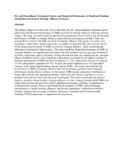| dc.description.abstract | The primary objective of this study was to determine the pre- and postalliance
formation factors influencing the financial performance of SMEs
involved in strategic alliances in Kisumu District, .Kenya. The study was
necessitated by anecdotal documentation of such factors and the financial
performance of SMEs in strategic alliances, particularly in developing
economies. Data was sourced from a total of 120 SMEs involved in strategic
alliances. Chi square was used to test hypotheses, while binary logistic
regression was applied to determine the effect of such factors on the financial
performance of SMEs involved in strategic alliances, while considering the
influence of institutional characteristics. The study found that financial
performance of SMEs in strategic alliances was significantly associated with
firm attributes such as age, type of business activities, legal status, place of
location, average income and firm size. Among the pre- and post-alliance
formation factors, prior experience with partners accounted for the highest
variance in financial performance of SMEs involved in alliances (13.2%);
followed by the trust for partners (11.4%) and partner’s reputation (9.7%).
Overall, the model explained up to 58.8 percent of variance in the financial
performance among targeted SMEs. The study concluded that the
involvement of SMEs in strategic alliances does not necessarily guarantee
better financial performance among alliance partners. In this regard, SMEs
require appropriate information to enable them choose most appropriate
partners; understand the culture of partners as well as potential risks and how
best such risks may be managed. The study recommends the need to: improve
awareness about business strategic alliances, as a key strategy through which
SMEs can secure their survival and growth in today’s globalized economies;
develop a comprehensive communication strategy aimed at promoting the
development of SMEs and encouraging entrepreneurs to initiate strategic
alliances; and develop appropriate curriculum on business strategic alliances
and encourage Technical, Industrial, Vocational and Entrepreneurship
Training (TIVET) institutions to implement the curriculum. | en |

